|
|
|
Sort Order |
|
|
|
Items / Page
|
|
|
|
|
|
|
| Srl | Item |
| 1 |
ID:
131820
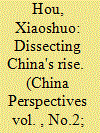

|
|
|
|
|
| Publication |
2014.
|
| Summary/Abstract |
The recent discussion of a "Beijing Consensus" and a China model seems to challenge neoliberalism as the dominating discourse on development. This paper attempts to explain the contradictions in China's development and discusses whether and how they can be redressed. Specifically, the paper analyses the key issues around the debate over the China model - how distinctive it is and whether it can be replicated elsewhere, and what real lessons can be drawn from China's rise. It proposes a more nuanced view of the economic, social, and political structures in China with a focus on its mixed economy, the role of the state at both the central and local levels, and the possibility of Chinese-style democracy. It also offers suggestions for improving the China model.
|
|
|
|
|
|
|
|
|
|
|
|
|
|
|
|
| 2 |
ID:
131814


|
|
|
|
|
| Publication |
2014.
|
| Summary/Abstract |
The move towards access to private homeownership represents a "revolution" in urban China during the reform era. New private residences not only symbolise "modernity"; they also set the scene for conflicts that pit homeowners, property developers, residents' committees, and local authorities against one another. By studying the attempt to form a "federation" of homeowners' committees in the city of Beijing, this article recounts and analyses the steps taken to construct a collective mobilisation, which involved the formation, in 2006, of an "application committee" requesting the creation of a federation of Beijing homeowners, the national petition launched in 2007 at the time of the debate on the Property Law (Wuquan fa), the organisation of "training classes" for homeowners in 2009, and the process of developing a new local regulation in Beijing in 2010.
|
|
|
|
|
|
|
|
|
|
|
|
|
|
|
|
| 3 |
ID:
131816
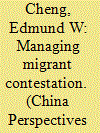

|
|
|
|
|
| Publication |
2014.
|
| Summary/Abstract |
This study considers the conditions under which China's massive internal migration and urbanisation have resulted in relatively governed, less contentious, and yet fragile migrant enclaves. Shenzhen, the hub for rural-urban migration and a pioneer of market reform, is chosen to illustrate the dynamics of spatial contestation in China's sunbelt. This paper first correlates the socialist land appropriation mechanisms to the making of the factory dormitory and urban village as dominant forms of migrant accommodation. It then explains how and why overt contention has been managed by certain intermediate agencies in the urban villages that have not only provided public goods but also regulated social order. It ends with an evaluation of the fragility of urban villages, which tend to facilitate urban redevelopment at the expense of migrants' living space. The interplay between socialist institutions and market forces has thus ensured that migrant enclaves are regulated and integrated into the formal city.
|
|
|
|
|
|
|
|
|
|
|
|
|
|
|
|
| 4 |
ID:
131817
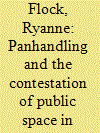

|
|
|
|
|
| Publication |
2014.
|
| Summary/Abstract |
Urban public space is a product of contestations by various actors. This paper focuses on the conflict between local level government and beggars to address the questions: How and why do government actors refuse or allow beggars access to public space? How and why do beggars appropriate public space to receive alms and adapt their strategies? How does this contestation contribute to the trends of urban public space in today's China? Taking the Southern metropolis of Guangzhou as a case study, I argue that beggars contest expulsion from public space through begging performances. Rising barriers of public space require higher investment in these performances, taking even more resources from the panhandling poor. The trends of public order are not unidirectional, however. Beggars navigate between several contextual borders composed by China's religious renaissance; the discourse on deserving, undeserving, and dangerous beggars; and the moral legitimacy of the government versus the imagination of a successful, "modern," and "civilised" city. This conflict shows the everyday production of "spaces of representation" by government actors on the micro level where economic incentives merge with aspirations for political prestige.
|
|
|
|
|
|
|
|
|
|
|
|
|
|
|
|
| 5 |
ID:
131818
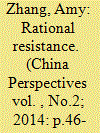

|
|
|
|
|
| Publication |
2014.
|
| Summary/Abstract |
This article examines the logic and framing of homeowner protests against Waste to Energy (WTE) incineration in Guangzhou. I argue that the concept of "rational resistance" emphasised by homeowner activists represents one way of understanding urban environmental contention in China. Urban homeowners use rational resistance to distinguish themselves from both villagers and the state. Their focus on rationality is a critique of the government's reliance on technology to resolve the social problem of waste management.
|
|
|
|
|
|
|
|
|
|
|
|
|
|
|
|
| 6 |
ID:
131815
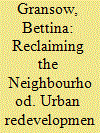

|
|
|
|
|
| Publication |
2014.
|
| Summary/Abstract |
This study examines social interventions into the everyday life of residents, families, and communities during a redevelopment project in an old town neighbourhood of Guangzhou. It further analyses how citizen activism unfolds in response to these redevelopment interventions. To better understand contention over the renewal of an old town neighbourhood - beyond negotiation of compensation for economic losses - the study is structured by a recognition-theoretical model of social conflict following Axel Honneth and Nancy Fraser.
|
|
|
|
|
|
|
|
|
|
|
|
|
|
|
|
| 7 |
ID:
131821
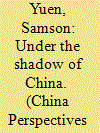

|
|
|
| 8 |
ID:
131819


|
|
|
|
|
| Publication |
2014.
|
| Summary/Abstract |
While the "state-led urbanisation" argument highlights the dominance of state power in China's urban process, the notion of "local state/village corporatism" pays attention to the significant stake of local governments and their rural collectivities in economic development and urban growth, especially in the region of Guangdong's Pearl River Delta. Yet, these two arguments overlook the multiple forms of collectivities, including the communal land system, local clanship, and territories of folk religion, and their participation in the urban process. This article adopts a more structural approach by seeing the "urban process" as the socio-spatial reorganisation of and struggle over "the collective" in the capitalist socio-spatial relations of production. With the ethnographic study of Village Z in Dongguan, I argue that proletarianisation is not simply an integral part of the urban process but also the background against which communal imagination and the cellular form of activism take their shapes. Local collectivities do not necessarily share the interests and values of the developmental states but counteract the local states at all levels, thereby perpetuating contestation over urban spaces.
|
|
|
|
|
|
|
|
|
|
|
|
|
|
|
|
|
|
|
|
|